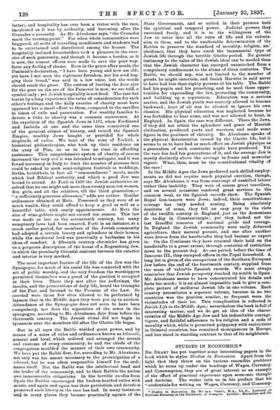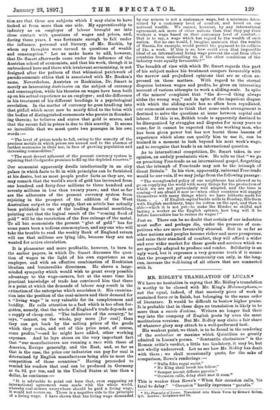STUDIES IN ECONOMICS.*
Da. SMART has put together some interesting papers in the book which he styles Studies in Economics. Apart from the light that they throw on the various recondite problems which he sums up under the headings of Wages, Currency, and Consumption, they are of great interest as an example of the effect of practical experience upon economic thought and doctrine. The writer tells us in his preface that his " credentials for writing on Wages, Currency, and Consump- • Shia." in Economics. By Wt. il1.1 Smart, M.A., LL.D., Lecturer cm PoliticalEoonomy in the Univercity ot Ulasgow. London : Macmillan and Co,
tion are that these are subjects which I may claim to have looked at from more than one aide. My apprenticeship to industry as an employer of labour brought me into close contact with questions of wages and prices, and, during these years, I was fortunate enough to fall under the influence, personal and literary, of Mr. Ruskin, by whom my thoughts were turned to questions of wealth and consumption." Let us make haste to add, however, that Dr. Smart afterwards came under the influence of the Austrian school of economists, and that his work, though it is embroidered here and there with irrelevant sermonising, is not designed after the pattern of that whimsical patchwork of pseudo-economic ethics that is associated with Mr. Ruskin's name. Nevertheless, Austrian or Ruskinian, Dr. Smart is merely an interesting doctrinaire on the subject of currency and consumption, while his theories on wages have been built up on his actual experience as an employer ; and the difference in his treatment of his different headings is a psychological revelation. In the matter of currency he goes headlong into that pitfall which must now be nearly filled to the brim with the bodies of distinguished economists who persist in flounder- ing therein ; he believes and states that gold is scarce, and that the recent fall in prices is due to this scarcity. It seems so incredible that we must quote two passages in his own words :—
" The level of prices tends to fall, owing to the scarcity of the precious metals in which prices are named and to the absence of Further economies in their use, in face of growing population and increasing commodities."
"The most devout adherent of the present currency system is rejoicing that Coolgardie promises to fill up the depleted reserves."
Our economist apparently dwells intellectually in an airy palace in which facts to fit in with principles can be furnished at his desire, but as most people prefer facts as they are, we may remark that the world's stock of gold has increased from
one hundred and forty-four millions to three hundred and seventy millions in less than twenty years ; and that so far
are the adherents of the present currency system from rejoicing in the prospect of the addition of the West Australian output to the supply, that an article has actually been published in one of the leading financial monthlies, pointing out that the logical result of the "coming flood of gold" will be the restriction of the free coinage of the metal. To all but economists the present " glut of gold" has for some years been a tedious commonplace, and any one who will take the trouble to read the weekly Bank of England return will see that millions are lying idle, because they are not wanted for active circulation.
It is pleasanter and more profitable, however, to turn to the earlier papers, in which Dr. Smart discusses the ques- tion of wages in the light of his own experience as an employer, and with an effective combination of Ruskinian idealism and businesslike directness. He shows a large. minded sympathy which would wish to grant every possible advantage to the wage-earners, but at the same time his practical knowledge of trade has convinced him that there is a point at which the demands of labour may result in the extinction of the enterprise which nourishes it. His examina- tion into the position of the coal-miners and their demand for a "living wage" is very valuable for its completeness and lucidity. He calls attention to a fact which is too often for- gotten, namely, that the whole of England's trade depends on a supply of cheap coal. "The industries of the country," he says, "cannot, on the whole, pay more [for coal] than they can get back by the selling prices of the goods which they make, and out of this price must, of course, come profits,"—and he might have added, other working expenses. And he lays stress on the very important fact that "our manufacturers are running a race with those of America, Europe generally, and the East, and, so far as that is the case, the price our industries can pay for coal is determined by English manufactures being able to meet the competition of those countries." Having proceeded to remind his readers that coal can be produced in Germany
a 6s. 9d. per ton, and in the United States at less than a dollar, he continues :— . "It is advisable to point out here that, even supposing an international agreement were made with the whole world, "hereby coal-miners everywhere should be paid a living wage, it would not secure us. There is a negative side to the principle of a living wage. I have shown that the living wage demanded by our miners is not a sustenance wage, but a minimum deter- mined by a customary level of comfort, and based on our national wealth. We cannot, however, by any international agreement, ask more of other nations than that they pay their workers a wage based on their customary level of comfort,— that is to say, a wage which has regard to the wealth of each nation. But no one would, I imagine, maintain that the wealth of Russia, for example, would permit the payment to its colliers of 24s. a week. If this is so, how could even that impossible ideal of an international living wage prevent the coal from other countries from underselling us, if the other conditions of the industry were equally favourable ? "
The breadth of view with which Dr. Smart regards this part of hie subject makes his treatment compare favourably with the narrow and prejudiced opinions that are so often ex- pressed on these matters. With regard to the eternal disputes between wages and profits, he gives an interesting account of various attempts to work a sliding-scale. In spite of the miners' complaint that "the d—d thing always slides the wrong way," and in spite of the impatient disgust with which the sliding-scale has so often been repudiated, our economist seems to think that some such arrangement is destined to solve the questions at issue between capital and labour. If this is so, British trade is apparently destined to be disorganised by struggles and disputes for many years to come, for it cannot be expected that the working man, who has been given power but has not learnt those lessons of experience which alone can qualify him to use it, can be trained in a moment to look beyond his next week's wage, and to recognise that trade is an international question.
As to international competition, Dr. Smart takes, in our opinion, an unduly pessimistic view. He tells us that "we go on preaching Free-trade as an international gospel, forgetting that the triumph of Free-trade may not be the triumph of Great Britain." In his view, apparently, universal Free-trade would be our ruin, if we may judge from the following passage :
"The wrongheaded policy of our neighbours has allowed us to go on supplying the world with many things for the production of which we are not particularly well adapted, and the time is coming—I am afraid it now is—when other countries will supply themselves with many things which we have hitherto made for them. . . . If English capital builds mills in Bombay, fills them with English machinery, buys its cotton on the spot, and then is able—which it is not yet—to make the Hindoo as skilful and lasting a worker as the English spinner, how long will it be before Lancashire has to reduce its wages P" Just so. There can be no doubt that certain of our industries
must suffer, and perhaps die, under the pressure of com- petitors who are more favourably situated. But in so far as other nations and peoples become richer and more prosperous, and raise their standard of comfort, they will afford a wider and ever wider market for those goods and services which we are specially adapted to produce and render. Solidarity is an ugly word, but it expresses a very genuine truth if it means that the prosperity of any community can only, in the long- run, increase the well-being of all others that are connected with it.



































 Previous page
Previous page